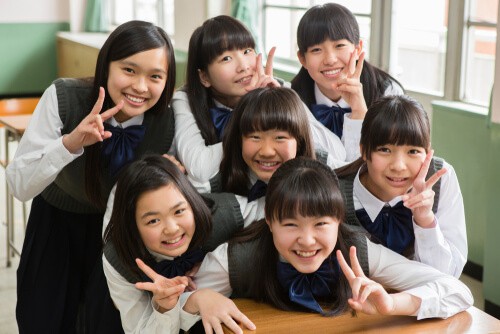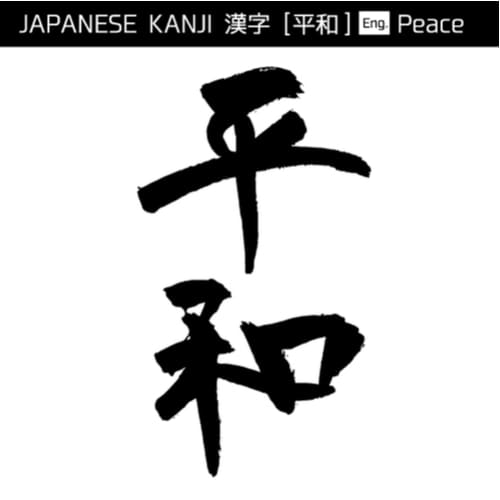Ever wondered how to say or spell the word “Peace” in Japanese? Here are different ways to say peace in Japanese.
The word in its written form looks beautiful and is commonly used as a tattoo symbol by many. It is also one of those words that is used in a majority of words, sentences, and phrases. So much so that it has now become an important part of the Japanese language.

Different Ways To Say Peace In Japanese
How Peace is Written in Japanese?
The simplest way of writing peace in Japanese is Heiwa [平和]. Heiwa can also represent something or mean someone having a calm presence. It can also mean being educated and harmonious.
The term Heiwa [平和] can be broken down into “Hei [平]” and “Wa [和]” which are two ideograms used together to represent peace in Japanese. It is believed that Wa [和] literally translates to peace in English.
But this is not the case, it actually is an ideogram that is used to represent Japan as it is the nation’s old name.
The word Hei [平] on the other hand, although said to be translated as peace, actually refers to something or someone ordinary or mediocre.
However, when combined, these two words Hei [平] and Wa [和] together stand for peace and harmony.

- Related: Best Way To Learn Japanese
- Related: Basic Japanese Words That You Can Use in Daily Conversation
How To Say Peace In Japanese?
Below listed are some of the ways one can say peace in Japanese. Although not all the words directly mean peace, some also carry a meaning that is almost similar to it.
Each word has a meaning or several meanings of its own and can be used in multiple sentences with multiple meanings. Carefully read the words and their sentences and you will see that they all have one word or parts of the word associated with them, Heiwa [平和].
Here are some of the different ways to say “peace” in Japanese.
Nagoyaka - 和やか
Pronunciation: nagoy-a-ka
Nagoyaka carries different meanings including mild, calm, quiet, amicable, friendly, harmonious, peaceful, etc.
You can use it in a sentence as ‘オフィスにはなごやかな雰囲気がある。’ which means ‘There is a friendly atmosphere in the office’.
Nagomu - 和む
Pronunciation: nago-mu
Nagomu stands for calm or relaxing, another way of saying peace.
You can use it in a sentence as ‘それは見る人の心を和ませます。’ which means ‘They are relaxing to watch’.
Another example is ‘その歌手の歌は心をなごませてくれる。’ which means ‘The singer's voice melts your heart.’
Waboku - 和睦
Pronunciation: wa-bou-ku
Waboku means peace and reconciliation.
Use it as a sentence as ‘ついに、インディアンの二人の酋長は和睦することに決めた。’ which means ‘At long last、 the two chiefs of the Indian tribes have decided to make peace.’.
Shizukesa - 静けさ
Pronunciation: shi-zu-ke-sa
Shizukesa in Japanese carries different meanings. These include stillness, silence, hush, calm, peace, and serenity.
You can use it in a sentence as ‘自然環境は、平和と静けさを作成します。’ which means ‘The natural environment creates peace and serenity’.
Another such example is ‘彼らは和睦を求めた’、 which means ‘They sued for peace.’
Chōwa - 調和
Pronunciation: cho-wa
Chōwa means peace and harmony in the Japanese language.
Use it in a sentence as ‘完璧な調和で起きてます’ which means ‘This is everyday life happening in perfect harmony’.
Rengō - 連合
Pronunciation: en-gow
Rengō stands for union, alliance, and combination. These words also relate to peace when used in the right sentence.
You can use it in a sentence as ‘だが、この弱者連合はすぐに行き詰まる。’ which means ‘However、 this coalition of the weak soon had major difficulties’.
Kyūsen - 休戦
Pronunciation: kyu-sen
Kyūsen means truce and peace.
You can use it in a sentence as ‘新任の大使は休戦を推し進めて、これ以上の殺りくを終わらせるでしょう。’ which means ‘The new ambassador will push for a cease-fire to stop the killing’.
Danketsu - 団結
Pronunciation: Dang-ket-su
Danketsu stands for unity or union.
You can use it in a sentence as ‘スポーツは平和と団結の象徴です。’ which means ‘Sports are a symbol of peace and unity," says Takahashi’.
Yasumi - 休み
Pronunciation: yas-mi
Yasumi means rest, peace, break, time off, etc. It is meant to relate to taking a break and living peacefully.
You can use it in a sentence as ‘たぶんあなたは休みをとる必要がある。’ which means ‘I realize that you probably need to get your rest’.
Rirakkusu - リラックス
Pronunciation: ri-rak-su
Rirakkusu stands for peace and relaxation.
You can use it in a sentence as ‘パティオの装飾は休息とリラックスへの誘いです’ which means ‘The decor of the patio is an invitation to rest and relaxation’.
Yūjō - 友情
Pronunciation: yu-jo
Yūjō stands for friendship, companionship, amity, etc.
You can use it in a sentence as ‘友情が試される時 あなたは本当に誠実かしら’ which means ‘A friend for life That's what you are to me’.
Seishi - 静止
Pronunciation: shei-shi
Seishi means stillness, stationery, or peacefulness in the Japanese language.
You can use it in a sentence as ‘注意:ビデオモードが付くデジタル静止カメラも使えます。’ which means ‘Note: Digital still cameras can be used if they have a video mode’.

Japanese Phrases That You Can Use To Say ‘Peace’:
The above are a few words that represent ‘peace’ in the Japanese language. But these are not all. Some of the Japanese sentences too can mean or represent peace. They don’t necessarily have to be one word.
These popular Japanese phrases or sayings are most commonly used and all carry an almost similar sentiment - peace.
Similar to all the above words, you will notice that all the sentences have within them the word, or characters associated with the popular Japanese word, Heiwa [平和] which stands for peace.
Here are some of the most popular phrases and their respective meanings.
Heiwa ni kurasu - 平和に暮らす
The term here means, ‘live peacefully.’
The sentence can be written as ‘世界中の子供達が平和に暮らせる世の中になりますように’ which means ‘Children all over the world deserve to live in peace.’
Anshin shimasu - 安心します
The above phrase means, ‘I feel at peace.’
The phrase can be said as, ‘私は少なくとも安心します’ which means ‘I feel reassured at least.’
Watashi tachi no mokuhyou wa chikyuu no heiwa desu - 私達の目標は地球の平和で
The phrase says, ‘Our goal is peace on earth.’
Sekai heiwa ga hoshī - 世界平和が欲しい。
The phrase is read as, ‘I want world peace.’
In Japanese the phrase can be framed as、 ‘こうした行為は世界平和に逆行するものである’ which means ‘Such an attitude tends to the peace of the world.’
Watashi no nozo no wa yasuragi to shizuke sadake desu - 私の望むのは安らぎと静けさだけです。
The Japanese translation of this phrase is, ‘All I want is peace and tranquility.’
Watashi no kokoro no yasuragi no tame ni, watashi wa shiru hitsuyō ga arimasu - 私の心の安らぎのために、私は知る必要があります
This phrase means, ‘For my peace of mind, I need to know.’
Gomeifuku wo inorishimasu - ご冥福をお祈りします。
The phrase stands for, ‘May your soul rest in peace.’
Heiwa wa totemo taisetsudesu - 平和はとても大切です。
This means, ‘Peace is very important.’
Nihon wa totemo Heiwa da - 日本はとても平和だ
The Japanese translation of this phrase is ‘Japan is very peaceful.’
Heiwa ga kaifuku shimasu - 平和が回復します
The above phrase means, ‘Peace is restored.’
Heiwa ga anata to tomoni arimasu yō ni - 平和があなたと共にありますように
The Japanese translation of this phrase is ‘May peace be with you’.
Kanojo o anshin sa sete kudasai - 彼女を安心させてください
The above phrase means, ‘Leave her in peace.’
Boku wa sekai no heiwa wo negau - 僕は世界の平和を願う
The Japanese translation of this phrase is, ‘I hope for peace in the world.’
Jibun to heiwa ni nari nasai - 自分と平和になりなさい
The Japanese translation of this phrase is, ‘Be at peace with yourself.’
Heiwa o tsukuru - 平和を作る
The Japanese translation of this phrase is, ‘Make peace.’
Subete no hito ni heiwa to ai o - すべての人に平和と愛を
The Japanese translation of this phrase is, ‘Peace and love to all.’
Koko wa honto ni heiwa na tochi desu - ここはほんとに平和な土地です
The Japanese translation of this phrase is, ‘This is a peaceful spot.’
Imaya ano fuufukan no heiwa wa ore no shuchuu ni aru - 今やあの夫婦間の平和は俺の手中にある
The Japanese translation of this phrase is, ‘The domestic peace of this family is henceforth in my hands.’
Heiwa no tame ni, wareware zen’in ga risuku o okasaneba naranai - 平和のために、我々全員がリスクを冒さねばならない
The Japanese translation of this phrase is, ‘We all must take risks for peace.’
Karera ga motomeru mono wa tada hitotsu, heiwa desu - 彼らが求めるものはただ一つ、平和です
The Japanese translation of this phrase is, ‘They ask for only one thing—peace.’
Different Ways To Say Peace in Japanese: FAQs
What is common among the above phrases and words?
-The above words, phrases, sentences, and descriptions show that ‘heiwa – 平和 (へいわ)’ is a popular Japanese noun which means ‘peace.’ Japanese native speakers use this noun to refer to a calm situation, which when translated in English, stands for peace and stillness. Almost all of the meanings of the above-mentioned sentences and phrases have the word or words associated with peace in them.
What are the kanji characters associated with Heiwa?
-The two kanji characters in the word Heiwa [平和] literally mean something flat and harmonized. Which in turn means peace - a calm situation where no one feels or is being threatened. The term is often used in most of the Japanese sentences or phrases to project calmness and stillness.
Takeaway:
So the next time you find yourself reading any Japanese text or sign and come across this word, Heiwa [平和], you know what it stands for. And if you are with a friend, be sure to tell them.




